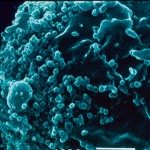Lien vers Pubmed [PMID] – 7545200
J. Immunol. Methods 1995 Sep;185(1):43-56
This paper describes an improved method for detecting tyrosine phosphorylation levels in T cell subsets by flow cytometry early after CD3 crosslinking stimulation. It consists in introducing gentle paraformaldehyde fixation between CD3 crosslinking in cold conditions and the shift to 37 degrees C, which activates downstream signalling machinery. We used the combined properties of monoclonal antibodies for stimulating cells and for detecting surface markers to analyze protein-tyrosine phosphorylation levels in T cells subsets following stimulations which mimic physiological activation. Overall data obtained in healthy subjects, using two- or three-color immunofluorescence, indicated that: (1) most CD3 positive cells phosphorylate tyrosine substrates following CD3 crosslinking stimulation and (2) helper cells phosphorylate tyrosine to a slightly better extent than cytotoxic cells after CD3 crosslinking. Nevertheless, the two subsets follow similar kinetic patterns and tend to retain a homogeneous profile. Processing of samples from HIV-seropositive patients showed heterogeneous phosphorylation levels in both subsets, when compared to normal donors. This assay should, in the future, lead to easy and rapid exploration of the signal transduction pathway in different subsets of T cells under normal and pathological conditions.

